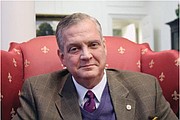Southern Baptist seminary report ties founders to slavery, white supremacy
By Adelle M. Banks | 12/28/2018, 6 a.m.
LOUISVILLE, Ky.
Founders of one of the nation’s largest seminaries owned more than 50 slaves and said that slavery was morally correct.
But an internal investigation found no evidence the school was directly involved in the slave trade, according to the seminary’s president.
A 71-page report released Dec. 12 from Southern Baptist Theological Seminary, the Southern Baptist Convention’s flagship seminary, said its early trustees and faculty “defended the righteousness of slaveholding.”
“They argued first that slaveholding was righteous because the inferiority of blacks indicated God’s providential will for their enslavement, corroborated by Noah’s prophetic cursing of Ham,” the report stated. “They argued second that slaveholding was righteous because southern slaves accrued such remarkable material and spiritual benefits from it.”
The seminary was founded in 1859 in Greenville, S.C., but suspended operations in 1862 during the Civil War and reopened in Louisville in 1877.
The Southern Baptist Convention was founded in 1845 when its members defended the right of missionaries to own slaves. Southern Seminary President R. Albert Mohler Jr. said the investigation expanded the knowledge and truth of what that defense meant.
“What we did not know and should have known was the degree to which open expressions of white racial supremacy were a part of the defense of slavery even on the part of some of the founding faculty of this school,” he said.
The report demonstrates how interwoven Southern Seminary’s history has been with the wider racial and political history of the denomination and the nation. It follows a 1995 resolution passed by Southern Baptists on the 150th anniversary of the denomination in which they said “we lament and repudiate historic acts of evil such as slavery” and “we genuinely repent of racism of which we have been guilty.”
Brantley Gasaway, chair of Bucknell University’s religious studies department, said the report, like the earlier resolution, is “symbolically significant.” It shows that some Southern Baptist leaders have grown in their sensitivity to diversity and racial reconciliation, he said.
But he said it did not point to substantive policy or structural changes.
“The leaders of Southern Seminary confess and lament their racist heritage, but they pledge only to continue to welcome and celebrate racial diversity at their institution,” said Dr. Gasaway, whose research focuses on evangelicals. “Such an approach reflects most evangelicals’ view that racial reconciliation does not necessarily include any reparations or recompense for the injustices suffered by minorities.”
Dr. Mohler said his decision to call for a one-year investigation by a team of six faculty — three African-American and three white — was prompted by actions of other institutions of higher education, specifically Princeton University, which released a report last year on its ties to slavery, including the sale of slaves on its campus.








